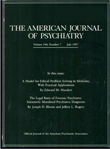Which elderly patients with remitted depression remain well with continued interpersonal psychotherapy after discontinuation of antidepressant medication?
Abstract
OBJECTIVE: This study was conducted to identify which elderly patients with remitted recurrent major depression remain well with maintenance interpersonal psychotherapy after discontinuation of active antidepressant medication (nortriptyline). METHOD: The authors examined outcomes of maintenance therapy over 1 year for 47 elderly patients who were randomly assigned to monthly maintenance interpersonal psychotherapy with placebo (N = 19) or to placebo and a supportive medication clinic without interpersonal psychotherapy (N = 28). A Kaplan-Meier survival analysis was performed on the basis of treatment assignment and subjective sleep quality assessed by the Pittsburgh Sleep Quality Index, on which good subjective sleep quality is indicated by a score of 5 or lower. RESULTS: Nine (90%) of 10 patients reporting good subjective sleep quality (by 1 month into continuation treatment) remained well for at least 1 year when treated with monthly maintenance interpersonal psychotherapy, versus five (31%) of 16 patients with good sleep quality assigned to a medication clinic, three (33%) of nine patients with impaired sleep quality treated with maintenance interpersonal psychotherapy, and two (17%) of 12 patients with impaired sleep quality assigned to a medication clinic. CONCLUSIONS: Recovery of good subjective sleep quality by early continuation treatment is useful in identifying which remitted elderly depressed patients will remain well with monthly maintenance interpersonal psychotherapy, following discontinuation of antidepressant medication, and which patients may be more vulnerable to recurrence of major depressive episodes in the absence of antidepressant medication.



